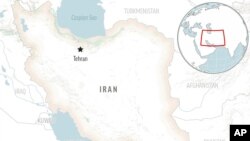Iranian protester Armita Abbasi, who media reports said was tortured and raped while in detention after being identified as a "leader" of protests sparked by the death of a young woman while in police custody for an alleged head scarf violation, has been released from prison.
"We experienced a very difficult time, but now I am extremely happy," Abbasi’s father wrote in a social media post along with a video of his 20-year-old daughter next to him.
Armita Abbasi’s lawyer, Shahla Orouji, said last week that a court accused her client of “propaganda against the Islamic republic” and “gathering and conspiring to commit a crime against national security.”
Abbasi was arrested Oct. 10 in her hometown of Karaj, west of the Iranian capital, nearly a month into the nationwide protests triggered by the death of Mahsa Amini while in police custody in September.
The Iranian government claimed she was “the leader of the riots” and that police discovered “10 Molotov cocktails” in her apartment.
In November, the U.S.-based cable news network CNN published an investigative report about the sexual assault and rape of some of the detainees from recent protests, including Abbasi, while they were being held in prisons across Iran.
A source told CNN that Abbasi was rushed to the Imam Ali hospital in Karaj on Oct. 17, accompanied by plainclothes officers while “her head had been shaved and she was shaking violently.”
“In the accounts, the medical staff attending to her spoke of the horror they felt when they saw evidence of brutal rape,” CNN added.
Neither Abassi, her family, nor her lawyer have publicly commented on the report.
Earlier in January, Abbasi and 14 other Iranian women incarcerated in the Kachoui prison near Tehran reportedly went on a hunger strike to protest the conditions of their imprisonment and the lack of medical attention at the facility.
At that time, her mother wrote on her Instagram account that, because of her daughter’s hunger strike, prison authorities were no longer allowing her to call her family. She also said the court did not accept the lawyer representing her daughter.
Since Amini's death, Iranians have flooded into the streets across the country to protest against a lack of rights, with women and schoolgirls making unprecedented shows of support in the biggest threat to the Islamic government since the 1979 revolution.
The U.S.-based Human Rights Activists News Agency said that, as of Jan. 29, at least 527 people had been killed during the unrest, including 71 minors, as security forces muzzle dissent.
Written by Ardeshir Tayebi based on an original story in Persian by RFE/RL's Radio Farda.




